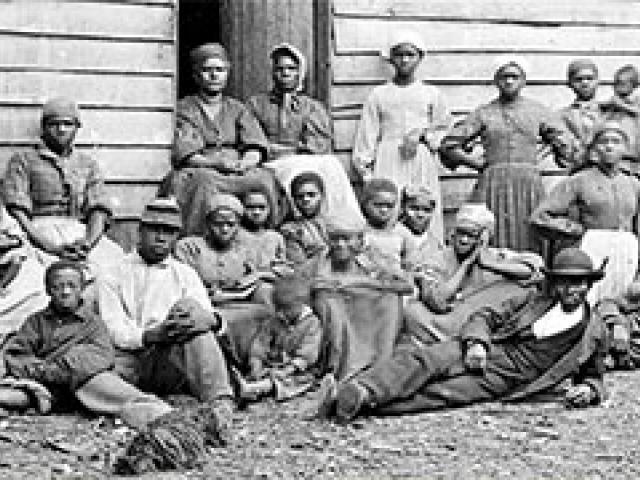By most accounts, Dr. Bertice Berry has led a successful life. Born in poverty, she earned a doctorate and became a nationally syndicated talk show host and best-selling author. Along the way, though, she made what she calls one of her "greatest errors."
Years ago, CBN News visited Dr. Berry at her beautiful home outside of Savannah, Georgia. In her dining room, an inviting place lined with overflowing bookcases, she read aloud from her novel Redemption Song.
"Old man Hunn wasn't so old then," she read. "He was out hunting my mama and me. He wasn't a real catcher. Others caught slaves for money. He caught 'em for keeps."
The villain of her book, an evil slaveholder, is named after a real man: John Hunn.
"John Hunn -- I knew the story, I heard the name, that he owned the plantation that our family lived on during slavery," Berry explained.
Despite her mother's repeated objections, Berry believed Hunn owned her ancestors.
"Especially in the 60s and 70s you would say," she takes on a militant voice, "'back when we were slaves, you know, that was my slave name,' and my mother would say, 'We were not slaves!' I'm like, 'All right. You have a slave fantasy.' Delaware was a slave state," she argued.
Villain or Hero?
But one day she came upon the PBS documentary "Whispers of Angels," about the Underground Railroad.
CBN News played a clip from the film for her, where the narrator states, "Burris eventually guided them to the home of the young Quaker, John Hunn, in Middletown."
Hunn was born in Camden, Delaware, and grew up a member of the Religious Society Friends, or Quakers.
Mike Richards, with the Camden Friends Meeting, has become an expert on Hunn. "He became known as the chief engineer of the Underground Railroad in Delaware," he said. "So he was very well known. And people that were helping the slaves escape would say, 'Go see John Hunn.'"
Hunn helped as many as 200 fugitive slaves make their way to freedom.
Robin Krawitz is program director of Delaware State University's Graduate Program in Historic Preservation and has studied Hunn for the past 20 years. She learned that his father, Ezekiel Hunn, also helped runaway slaves escape.
"John Hunn's father and uncle were the owners of this property; they inherited it in 1794," Krawitz explained as she showed CBN News around Wildcat Manor on a cold winter day.
Pointing to the frozen river, she explained that Ezekial Hunn had funded "an African American boatman to ferry people from here and from the St. Jones River over to New Jersey, which was the closest point of freedom."
His son, however, had other plans as a young man.
In a private home owned by a descendant of John Hunn, we had the rare opportunity to see a beautiful oil painting of him at age 22. At about the time of the portrait, he finished his training to be a silk merchant.
When he went to visit his older sister, Patience, a devout Quaker, she took one look at his fancy clothes and said, "Throw off thy Babylonish garment!"
"She basically read him the riot act," Krawitz chuckled telling the story. "She believes Patience was saying, in essence, 'Come back to the faith; be who you are.'"
Underground Railroad
And he did. Hunn was 27 years old when he became involved with the Underground Railroad.
On a cold, snow-covered day, he was washing his hands at a pump outside his home, when he saw an unfamiliar covered wagon approach.
Krawitz picks up the story from here.
"There was a group of people who were escaping enslavement from Queen Anne's County in Maryland traveling all night in a wagon and on foot," she said. "He brought the women and children into the house, and then the men went out into the barn. And they were all housed and warmed up and fed to get them ready to continue on their journey."
But a neighbor turned them in to the local magistrate. While the fugitives eventually made their way to freedom, Hunn was prosecuted in federal court.
Under the Fugitive Slave Law, it was a federal crime to assist runaway slaves, and slave owners could sue anyone who did so.
The New Castle Courthouse looks the same today. Looking around, one can imagine the scene when Hunn was brought before Judge Roger Taney.
Taney would later write the infamous Dred Scott decision, ruling that African Americans did not have civil rights protected by the U.S. Constitution.
Hunn didn't contest the charges, and Judge Taney imposed a heavy fine. Hunn's world fell apart. He lost everything. His family had to move in with relatives, and his 6-year-old son died after a long illness.
Still, he steadfastly continued his work.
"I think his calling was so strong, and he felt this issue was such an important issue, that he didn't feel he could stop, that he had to do this," Richards told CBN News.
Hunn died at age 76. He was buried in the small graveyard behind the Camden Friends Meeting House. On his deathbed, he ordered his son to burn all records of his activity in the Underground Railroad.
"I ask no other reward for any efforts made by me in the cause than to feel that I have been of use to my fellow men. No other course would have brought me peace of mind," he wrote.
"It was a shock," Berry said. "I've used this man's name, who was the southernmost conductor on the Underground Railroad, who remained hidden, the same way we do with everything -- we think everything is black and white, good and evil, sin and righteous."
"You know, no! No. You know, there's so much more to every story if you just look a little further," she said.
Setting the Record Straight
And that she did. Determined to set the record straight, Berry wrote The Ties That Bind: A Memoir of Race, Memory, and Redemption.
She imagines what she would say to him, given the opportunity.
"Dude, you are so cool; thank you, and while the laws are against you now, years from now everyone will know that you're right," she said.
Hunn's son, Jonathan, grew up to be governor of Delaware, where he ratified the 13th Amendment of the Constitution, abolishing slavery.
**Originally published in Feb. 2018
Did you know?
God is everywhere—even in the news. That’s why we view every news story through the lens of faith. We are committed to delivering quality independent Christian journalism you can trust. But it takes a lot of hard work, time, and money to do what we do. Help us continue to be a voice for truth in the media by supporting CBN News for as little as $1.










 Subscribe
Subscribe Follow
Follow CBN.com
CBN.com




 Support CBN News
Support CBN News







